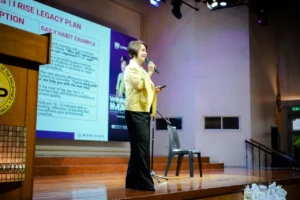In 2026, leaders will not only be measured by strategy, profit, or knowledge—but by their ability to connect with people, lead with empathy, and inspire trust. That ability comes from emotional intelligence (EQ).
As a Filipino motivational speaker, I’ve seen how EQ turns leadership from a title into a true calling. According to Electro IQ, emotional intelligence predicts 67% of a leader’s effectiveness in contemporary organizations. So, in government and corporate settings alike, leaders who understand emotions—both their own and others’—are the ones who create cultures of resilience, innovation, and trust.
The Bible reminds us: “Rejoice with those who rejoice; mourn with those who mourn” (Romans 12:15). This is a timeless call to emotional awareness and compassion—the very essence of emotional intelligence.
Why EQ Matters More than IQ in 2026
The workplace is changing: hybrid teams, generational diversity, digital disruptions. Technical IQ alone is no longer enough. Leaders who thrive in 2026 will be those who can:
- Build trust quickly across diverse stakeholders.
- Adapt their communication in high-pressure moments.
- Inspire motivation when morale is low.
- Resolve conflicts without compromising relationships.
EQ has become the differentiator that separates effective managers from transformational leaders. As a motivational speaker in the Philippines, I emphasize that emotional intelligence is no longer optional, as it’s now essential.
The S.M.A.R.T. Framework for Leaders
As a Filipino motivational speaker, here’s how I guide leaders through the S.M.A.R.T. framework:
- Self-Awareness: Recognize emotional triggers, strengths, and blind spots to lead with clarity and authenticity.
- Managing Emotions: Regulate reactions under stress with calm and composure to model resilience.
- Authentic Motivation: Lead with genuine drive rooted in values and purpose, not ego or external approval.
- Relationship Management: Build trust, empathy, and collaboration to strengthen influence and connections.
- Transformative Action: Apply emotional intelligence in decisions, communication, and leadership practices to create lasting impact and cultural change.
This framework helps leaders practice EQ in daily decisions, not just theory. As a keynote speaker, sharing practical tools like these helps leaders create meaningful change.
EQ in Government + Corporate: Building Trust & Engagement
I’ve witnessed firsthand how EQ transforms both government and corporate leadership. In one training with government supervisors, leaders who practiced empathy and improved listening saw their teams’ productivity soar.
In corporate settings, executives who modeled emotional regulation during high-pressure sales negotiations not only closed deals but also built long-term client trust. This is why organizations increasingly partner with an inspirational speaker to strengthen leadership culture from the inside out.
EQ creates what every organization needs: engaged, loyal, and motivated people.
How Gospel Truths Deepen Emotional Awareness
Scripture is rich with wisdom on emotional intelligence:
- “A gentle answer turns away wrath, but a harsh word stirs up anger” (Proverbs 15:1).
- “Be quick to listen, slow to speak, slow to become angry” (James 1:19).
- “Love is patient, love is kind” (1 Corinthians 13:4).
These truths are practical guides for leaders seeking to manage emotions, connect authentically, and foster unity. As a female leadership speaker, I often see how faith-centered leadership empowers women and men alike to lead with grace and strength.
Stories of Transformation: From Conflict to Connection
One executive I coached struggled with conflict management. By applying EQ principles—listening, reframing, and showing empathy—he transformed tense client relationships into opportunities for growth.
Another leader in a government agency realized that self-awareness allowed him to stop reacting impulsively. His calm approach under pressure became a model for his team.
These stories show EQ isn’t optional—it’s a leadership necessity. As an empowerment speaker for women, I’ve also seen how emotional intelligence gives women leaders the courage to lead with both strength and compassion.
Action Steps for Leaders
To develop EQ, start here:
- Practice daily reflection – Ask: “What emotion drove my actions today?”
- Seek feedback – Invite peers to share how your leadership makes them feel.
- Pause before reacting – Create space for wisdom to guide your response.
- Integrate values – Ensure decisions reflect both empathy and integrity.
Inspire Change Through Stronger Leadership
As a Filipino motivational speaker, Toni Miranda guides leaders in turning these principles into powerful, everyday leadership habits. Book now to equip your team with practical EQ strategies and faith-grounded insights!
Frequently Asked Questions (FAQs)
As a Filipino motivational speaker, these are some of the most common questions leaders ask about developing emotional intelligence in leadership:
Why is emotional intelligence important for leaders?
Because it equips leaders to inspire trust, resolve conflict, and create a motivated workplace culture—skills critical for 2026 and beyond.
Can emotional intelligence be learned?
Yes. With self-awareness, practice, coaching, and faith-based principles, leaders can grow EQ and apply it daily.
What does the Bible say about emotional intelligence?
Verses like James 1:19 and Proverbs 15:1 show timeless wisdom in listening, patience, and emotional regulation.



